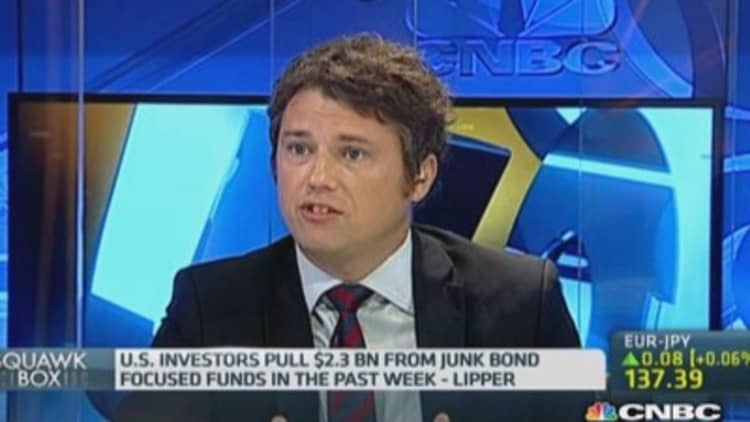A simmering mix of a strong U.S. dollar and weak commodity prices may be brewing up trouble for junk bond exchange-traded funds (ETFs) with a hefty weighting in materials companies.
"If the U.S. dollar stays strong, that will exacerbate the impact of the weaker commodity prices" on miners' cash flow and the ability to meet debt payments, said May Zhong, a credit analyst at Standard & Poor's.
Coal companies, especially U.S.-based ones competing in the export market, are a particular concern, she said. Faced with oversupply, thermal coal prices have fallen to near five-year lows, while the has risen as much as 8.3 percent so far this year.
Read More Why ETFs may be the biggest bond worry
But Australian miners may also take a hit, she said. "The Australian dollar hasn't fallen to the same extent as major commodity prices. It's still relatively strong compared to the U.S. dollar," she said.
"You do need a weak local currency to help those [B-rated] miners or shield them from weaker commodity prices," Zhong said.

That may have a knock-on effect on the high-yield bond ETFs, which in turn may weigh the entire junk-bond segment. Around 14.7 percent of the holdings of the iShares iBoxx high-yield ETF, which tracks the Markit iBoxx index, are in the oil and gas industries, while another 6.5 percent are in basic materials.
Read More Is the long-expected high-yield selloff under way?
The ETF has around $13.3 billion in net assets. While that's a drop in the bucket compared with a total bond market estimated at around $38 trillion, some analysts consider bond ETFs a market risk as they are more susceptible to hot money flows, potentially affecting the trading liquidity of underlying bonds. Around 37 percent of U.S. corporate credit is held by households and funds, according to RBS data from August.
To be sure, the default rates on bonds remain low, with S&P noting that in the 12 months through June of this year, 25 speculative grade issuers defaulted. That compares with more than 900 holdings in the iShares iBoxx ETF.
But while the global default rate is 1.65 percent among all speculative-grade bonds, it's at 3.1 percent for U.S. speculative-grade energy and natural resources players, according to S&P data; among the 47 global corporate defaults this year, 14 were in sectors related to energy, mining or other natural resources.
Some remain relatively unconcerned.
Read More Junk bonds aren't junky: Pimco
"Commodity prices haven't been low enough, long enough to drive widespread defaults. We're some way off from that," said Will Oswald, global head of fixed income, commodity and currency research at Standard Chartered. "The company would need to be close to default [for the stronger dollar] to be a material risk. You would already see signs of stress in those companies."

Others see the effect of a stronger dollar on commodity companies' debt as more of a longer-term risk.
"It's pretty far away for most companies, but it is a risk," said Steve Goldman, managing director at fixed income manager Kapstream Capital.
He thinks the rising cost of capital for high-yield commodity companies may be a bigger concern, noting many of these companies, particularly in Asia, rely on floating rate debt, such as bank loans, rather than fixed-rate debt. This may become an issue as the U.S. Federal Reserve is widely expected to raise interest rates in the next year, he noted.
Read More Junk bond warning? No way, says BofAML strategist
Some active bond managers are simply avoiding taking a position on commodity issuers.
Raymond Lim, head of Asian bonds at Amundi, which has more than 800 billion euros ($1.02 trillion) under management, views the U.S. dollar's rise as more of an interest coverage and earnings issue for commodity companies, rather than a default risk, but he noted that Amundi is "not too positive" on that sector, preferring other parts of the bond market.
—By CNBC.Com's Leslie Shaffer; Follow her on Twitter @LeslieShaffer1


